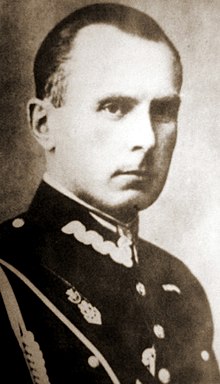Henryk Leliwa-Roycewicz
Henryk Leliwa-Roycewicz (born July 30, 1898 in Janopol , † February 23, 1990 in Warsaw ) was a Polish officer and eventing rider .
Henryk Leliwa-Roycewicz was a captain in the Polish army . In 1936 he started eventing at the Olympic Games in Berlin. In the individual evaluation, Leliwa-Roycewicz took 15th place on his horse Arlekin III in the three-day competition in which seven different disciplines had to be mastered. In the team competition he won the silver medal behind the German team together with Seweryn Kulesza and Zdzisław Kawecki . The cross-country ride in particular was extremely difficult, and 32 out of 46 riders did not finish. Three of the best horses then had to be euthanized.
On December 2, 1936, the National Olympic Committee of Czechoslovakia , whose riders had finished fourth, protested at the 24th Congress of the International Federation of Equestrian Sports (FEI) against the award of the silver medal to the Polish team. Kawecki left out a turning point. The protest was rejected. In contrast, the Polish sports historian Mariusz Heron takes the view that the Polish team was deliberately discriminated against by the German organizers in order not to endanger the host's gold medal.
In 1939 Henryk Leliwa-Roycewicz was the commander of a Wielkopolska cavalry regiment. On September 27, 1939, he was injured in an encounter with soldiers of the Red Army and then fled the hospital in Stryj . During the German occupation he was an officer in the Polish Home Army in Warsaw. He was seriously injured during the Warsaw Uprising . Immediately after the war he was promoted to major and worked in horse breeding. In 1949 he was arrested by the secret police and sentenced to six years in prison, acquitted and rehabilitated in 1956. He turned back to equestrian sport and worked as a trainer and horse expert for the Polcargo company .
In 1990 he was promoted to colonel in the Polish Army ; it was highly decorated, including the Virtuti Militari of various classes and the order of Polonia Restituta . He is buried in the military part of the Powązki cemetery .
Web links
- Henryk Leliwa-Roycewicz in the Sports-Reference database (English; archived from the original )
Individual evidence
- ↑ a b Volker Kluge : Summer Olympic Games. The Chronicle I. Athens 1896 - Berlin 1936. Sportverlag Berlin, Berlin 1997, ISBN 3-328-00715-6 , p. 901.
- ^ Mariusz Heron: Pamięci "Srebrnej Drużyny". Polscy kawalerzyści na berlińskich igrzyskach w 1936 roku. Retrieved March 16, 2014 (Polish).
- ↑ Berlin 1936. czyli: o słynnym "polskim" olimpijskim konkursie WKKW (detailed report on the eventing competition at the Olympic Games 1936). stajniatrot.pl, August 31, 2012, accessed March 16, 2014 (Polish).
| personal data | |
|---|---|
| SURNAME | Leliwa-Roycewicz, Henryk |
| BRIEF DESCRIPTION | Polish officer and eventing rider |
| DATE OF BIRTH | July 30, 1898 |
| PLACE OF BIRTH | Janopol |
| DATE OF DEATH | February 23, 1990 |
| Place of death | Warsaw |

